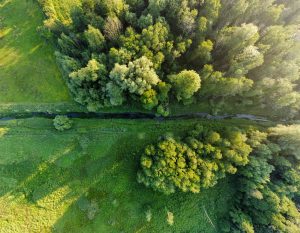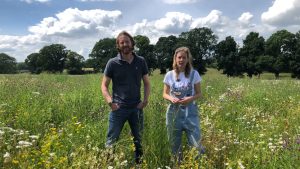[ad_1]
The government has announced a new arrangement with the British Standards Institution to develop a suite of high-integrity nature investment standards as part of the Nature Markets Framework, which aims to develop a new harmonised approach for measuring on-farm emissions and environmental impacts.
In a statement Defra stated: “For investment in nature markets to grow, participants need to have clarity and confidence in the principles and standards that should be used to structure investments.
“Clarity is also needed on the governance arrangements to ensure that these new, emerging markets will operate transparently and deliver benefits for nature, the economy and local communities.”
Farming Minister Mark Spencer said: “We’ve been listening to the farming sector, and the measures announced today will not only help them to calculate their carbon footprint, but also open up new financial opportunities, such as combining private commercial opportunities with our new farming schemes support.”
Need for consistency in monitoring and reporting
The agricultural industry has called for evidence-based tools to support the robust monitoring, reporting and verification of greenhouse gas emissions on farms. Whilst there are already numerous tools on the market for farmers to assess their emissions and calculate carbon footprint inconsistency in the results has led to low confidence from industry and low uptake.
By developing a harmonised methodology and setting out by 2024 how farmers will be supported to measure their emissions and the government can help the agricultural sector reduce emissions across the supply chain – including from livestock, nutrient management, and farm equipment.
Assessing benefits delivered
In its report Nature markets: A framework for scaling up private investment in nature recovery and sustainable farming (March 2023) the government acknowledges that:
- units sold in nature markets should be based on robust assessment of the benefit delivered (for example the amount of biodiversity restored, carbon captured or nutrient pollution reduced)
- the methodologies used to issue units should be defined in codes and standards, reviewed periodically – and predictably – and updated when the evidence base improves sufficiently
- standards should be transparent in their approach to quantifying benefits and reasonable margins of error that must be tolerated to allow markets to operate.
Nature Markets Framework
The framework aims to support nature markets grow in a way that makes them fair, effective and accessible to farmers and sets out:
- Core principles to ensure markets operate with integrity and deliver positive outcomes. Market development will be monitored and development of markets supported in line with these principles.
- Current rules for how farmers and other land and coastal managers can access markets and combine income streams, and plans to further develop policy in this area.
- A new arrangement with the British Standards Institution to develop a suite of high-integrity nature investment standards. These will enable new markets to develop and emerging markets to scale up and operate soundly.
- Next steps to clarify and develop institutional and regulatory roles and market infrastructure needed to ensure good market governance.
Alongside this, the Green Finance Institute will develop an online toolkit to help farmers identify and access private payments for environmental benefits.
The measures will complement the existing support that the government has in place to help the agricultural sector reach net zero. This includes support through Environmental Land Management schemes to reduce greenhouse gas emissions from farms.
As demonstrated by the successful UK-scale operation of the UK Woodland Carbon Code and the UK Peatland Code, there is a clear advantage in achieving scale and consistency of market offer across the UK.
Addressing the lack of standards
The absence of a standardisation process for quantifying the benefits of an ecosystem service (for example biodiversity, flood mitigation or carbon) in the form of credits or units is holding back investment and market development.
There has been innovation to develop new and prototype methodologies, but there is currently no pathway for successful methodologies to be recognised as sufficiently robust to underpin high integrity nature markets.
By appointing the British Standards Institution (BSI), the government seeks to facilitate an industry-led process to develop a suite of interconnected investment standards across ecosystems services, with a pipeline of investment standards for nature markets, starting in early 2023 and continuing for up to three years. This is to include:
- Development of an overarching investment standard for nature markets and nested standards for a range of ecosystem services, habitats and land uses
- Suitable accreditation arrangements for codes and standards
- Support for farm-level monitoring, reporting and verification, for example carbon audits
These will include an overarching “governing principles” standard and nested standards for specific ecosystem services and/or land uses/habitats.
Wendling Beck – an example of an environmental project creating credits
The Wendling Beck Environment Project is a habitat creation, nature restoration and regenerative farming project spanning almost 2,000 acres of farmland in Norfolk.
Four farmers, local authorities, environmental organisations and a water utility company have joined forces to manage the land for environmental benefits, while enabling agricultural businesses to diversity and supplement their farming income through nature markets.
One of the farmers, Rosie Begg of Gorgate Farms, spoke about the project at a recent Agriculture 101 event.
The project involves adoption of low-carbon farming systems, creation of circa 20km of hedgerows and a range of other biodiversity-rich habitats (species-rich grassland, lowland heath and woodland), and the restoration of around 5km of river and 135 acres of floodplain.
It will benefit from multiple nature markets:
- biodiversity net gain
- nutrient neutrality
- carbon credits
- additional funding from ELM
Baselines have been developed for all these markets and revenue for the farming businesses involved is expected to increase by around £30million (Net Present Value) over the next 30 years, including nature market income, the regenerative production of blackcurrants, a new livestock enterprise, farm shop and café and eco-tourism.
A new cycle and bridle path has been developed to allow local communities to benefit from access to nature and the project will also build resilience to flooding in the local area. The project now aims to use the knowledge and experience to help other landowners to follow a similar model.
More about the Nature Markets Framework.
[ad_2]
Source link





